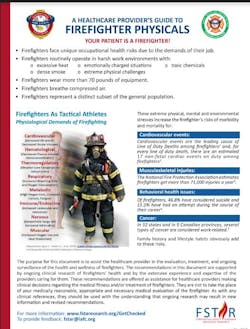IAFC Releases Guide for Firefighter Physicals
As research continues to show that firefighter's are more susceptible to medical issues due to their duties, the International Association of Fire Chiefs released "A Healthcare Provider’s Guide to Firefighter Physicals."
The guide addresses the diseases, exposures, illnesses, injuries and physiological demands that firefighters are most prone to suffer. It is designed to explain firefighting to healthcare providers and NFPA's 1582 physical requirements.
“Firefighters need healthcare that is tailored to the inherent risks of their dangerous jobs,” IAFC President John Sinclair said. “The guide provides doctors and firefighters clear information about the clinical care needed to address these risks. The IAFC encourages all firefighters to be strong advocates for their own health and wellness by making sure their doctor examines them for the many health risks they face.”
A survey conducted by the IAFC found 80 percent of career respondents receive annual firefighter physicals while only 45 percent of volunteers get an annual physical.
“As a former firefighter and department physician with the Boston Fire Department and now as the primary care provider for many Boston-area firefighters, I have developed a unique perspective and understanding of the many immediate and long-term serious health risks associated with firefighting,” Dr. Michael Hamrock said.
Hamrock was part of the team that worked to create the guide that's based on research and firefighter health statistics.
According to the National Fire Protection Association, 51 percent of on-duty deaths are caused by sudden cardiac arrest.
In her research at Skidmore college, Dr. Denise Smith found for every line-of-duty death there are an estimated 17 nonfatal cardiac events among on-duty firefighters.
“These guidelines will be extremely beneficial to primary-care clinicians and have a profound impact on improving the health and saving the lives of many firefighters," Hamrock said. "Primary-care providers will now be better equipped to more effectively screen and intervene early on the specific occupationally related illnesses that are disabling and killing too many of our firefighters.”
